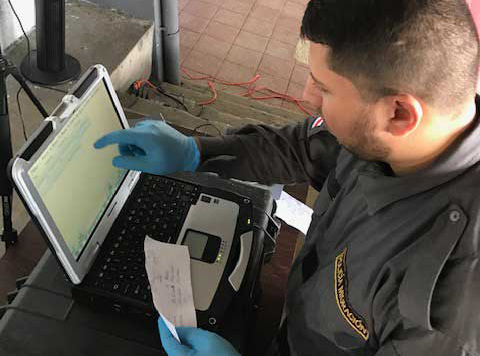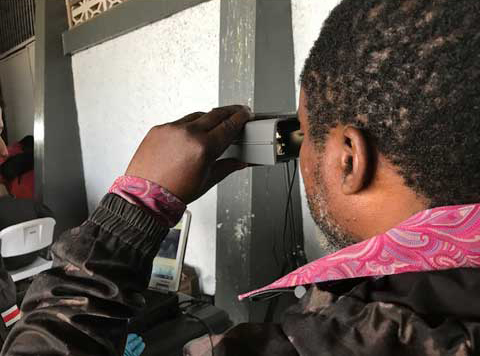According to a 12-sentence Reuters report stemming from a 3:35 minute Nacional Policia Commendante news conference announcement where no questions were entertained, Nicaragua has arrested four men with suspected ties to the Islamic State terrorist group. The reputed ISIS terrorists — two Egyptians and two Iraqis — had crossed into Nicaragua from Costa Rica, where they had "registered" on June 9.
Three of the four are the same men who a week earlier were publicly reported to be sought by the U.S. Department of Homeland Security, after an intelligence alert to Mexican authorities was leaked and confirmed by Breitbart's border and cartel team. It's unclear why a fourth migrant was apprehended with them.
This is brand new reporting, and the story is still unfolding, but following are some answers to obvious questions and perspective from my own decade-long reporting and research about the terror-travel threat at the U.S. southern border and the migration of Middle Easterners through Latin America — and based on reporting from my December trip to Costa Rica and Panama.
1. Why do homeland security agencies think these four men are ISIS terrorists on their way to the U.S. border?
Intelligence community sources with direct knowledge of the situation tell me it remains unknown whether the travelers are linked to ISIS or any terror group because the information that prompted the original alert came from a single human source of unknown credibility. The source was a former migrant now living in Venezuela, though not necessarily in the proximity of the Iraqis and Egyptians as they traveled through Panama, Costa Rica, and Nicaragua on their way to the U.S. border along a route I reported about at length earlier this year.
It's still early, however, and one of the Iraqis is believed to be a convicted murderer in Iraq who was supposed to be serving a life sentence, one source told me. That Iraqi was carrying a genuine passport, apparently with his real name.
When U.S. intelligence and law enforcement entities receive such unverified information from a source with no track record, duty requires that they take action to corroborate the source's information via investigation and also to determine the credibility of the previously unused source. Duty also would require sending an "Be On The Lookout" alert to partner countries like Mexico to assist in apprehending the travelers, which explains why the original leaked alert was sent out. American law enforcement and intelligence officers in the region will want to interview the suspects, determine actual identities, and deal with them should investigation corroborate the original tip. In addition to interviewing the men, the American agencies (ICE, CIA, FBI, and DIA) will want to check with allied intelligence services, especially those of Iraq and Egypt, to determine whether any hold derogatory intelligence about the men indicating ISIS affiliation. So far, according to my sources, none of the four travelers were on U.S. terrorism watch lists prior to apprehension this week (they are, of course, watch-listed now that someone has made accusations), nor did any have derogatory intelligence about them in U.S. systems. No conclusions should be drawn from that, since terrorist organizations would want to send "clean" operatives.
2. Why would ISIS terrorists "register" in Costa Rica as Reuters reported?
As I documented in December, Panama and Costa Rica developed a policy they call "Controlled Flow", which is essentially a government-run assembly line that moves thousands of U.S.-bound migrants entering Panama from South America straight through to Nicaragua on buses, after providing housing, medical care, and temporary legal status. Thousands of the migrants happen to hail from Muslim-majority countries such as Iraq, Syria, Iran, Pakistan, Afghanistan, Bangladesh, and 30 other so-called "countries of national security interest" like Egypt.
To take advantage of these smuggler-fee-saving travel benefits, migrants are obliged to "register" with Panama and Costa Rica (Nicaragua does not participate). They register first as the Panamanian military police collect them from the Darien Jungle after long treks out of Colombia, and they register again when the Panamanian buses drop them over the border to the Costa Ricans at Paso Canoas, as I have personally observed.
As an interesting and somewhat relevant aside, American law enforcement has taken advantage of Controlled Flow for counterterrorism, asking both Panama and Costa Rica to require every registered migrant to provide their fingerprints, biometric eye scans and facial recognition photographs using American-provided equipment. The biometrics are then given to the Americans. I witnessed the process in Costa Rica.


Using American-bought equipment, Costa Rican immigration officials collect biometric eye scans and fingerprints in Paso Canoas at the Panamanian border.
My intelligence community sources tell me that all four of the apprehended migrants "registered" and provided their biometrics. But again, it was a human source who singled them out, not any alert that came from the biometrics they provided.
3. Why is Nicaragua going to "deport" such suspects and what will happen?
Central American governments understand that the United States has a strong interest in filtering potential terrorists from the migrant flows moving through their territories, in the understanding that transiting terrorists are not very interested in attacking them directly. Most allow the United States to post homeland security investigators and analysts in their countries. But not so much Nicaragua, whose leftist Sandinista government mistrusts and dislikes the United States, and is generally uncooperative and hostile in ways that have precluded much of a U.S. homeland security infrastructure there. However, U.S. agents are stationed in significant force in friendlier and more cooperative Panama, Honduras, and Costa Rica. The United States most likely asked Nicaragua for the inexpensive favor of deporting the suspects to countries where the Americans are better set up.
4. What will the American involvement be?
The Americans will probably want the suspects detained in Honduran facilities (though possibly in Panama) while investigations play out to verify everyone's stories. The Americans will interview the suspects at length and at will during the investigation. Additionally, Honduras and Panama both have arrangements with the United States whereby terrorist suspects, or other known undesirables, can be airlifted to their home countries.
5. Will we ever learn whether the migrants really were ISIS terrorists?
Probably not. National security terrorism investigations, especially in foreign countries, fall squarely in the realm of protected and confidential. Usually, all information surrounding the apprehensions and investigations of terrorist suspects abroad will be classified and not available to the public. Occasionally, information leaks out, but U.S. homeland security does not like to confirm or deny terrorism intelligence investigations for fear that it would expose means, methods, and sources that would help future terrorists evade them. Also, most American media outlets are uninterested in knowing about these cases, therefore do not press officials for answers and updates, or file Freedom of Information Act requests.
6. Have other reputed terrorists been caught en route to the U.S. border?
Yes. This is hardly the first time U.S.-bound terrorist suspects have been caught in Panama and Costa Rica. As I extensively reported, it slipped out that Somali terrorist suspect Ibrahim Qoordheen was apprehended in Costa Rica in 2017 and deported to Panama for American investigation. A Costa Rican immigration official told me several other suspected terrorists also were caught in Costa Rica after Qoordheen and handed over to the Americans in Panama.
In 2016, six suspected Pakistani terrorists were apprehended in Panama on suspicion of links to al Qaeda. All were eventually deported from Panama.
In December 2018, an INTERPOL statement announcing the arrests of 49 human smugglers in the multi-nation "Operation Andes", targeting networks that funneled migrants from places like the Middle East into Panama and out of Costa Rica en route to the U.S. border, said four arrestees were linked to fraud, homicide, "and terrorism".
The existence of more publicly unknown cases is highly likely; these ones slipped out in various ways as did news of the current four now in detention.
Conclusion
The two Egyptians and two Iraqis may well turn out to have no connection to terrorism, or cannot be linked because they are clean. But American authorities are duty-bound to run this all the way to ground because, as I very recently reported, ISIS wanted to send a team over the U.S. southern border through Mexico as recently as 2016. I've also reported that in recent years, American authorities have intercepted at least 100 migrants who were on U.S. terrorism watch lists, which increases the probabilities that some of them would want to commit violent acts once across the border.
An investigation will have to run its course and, once it does, the public may well never be told of the outcome for a very wrong and unfortunate reason: If past experience indicates future behavior, this is a story that major American news media with the biggest audience shares are going to ignore with all of their might.
Reputed ISIS terrorists on their way to infiltrate the U.S. Southwest Border would not only confirm President Donald Trump's worldview, but possibly add real political force to his illegal-immigration policy prescriptions for the southern border.
But working hard to ignore this story into oblivion will not serve anyone's right to know about public safety problems that, if not aired and explored in the normal way, could lead to tragedy, such as when ISIS terrorists posing as Syrian war refugees and asylum-seekers infiltrated a wholly disbelieving and unprepared Europe starting in 2015 and went on to create bloody mayhem across the continent.
